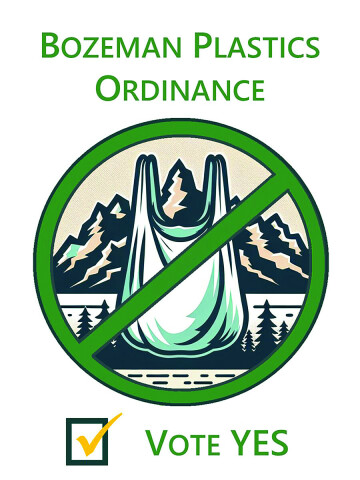Reducing Single-Use Plastics in Bozeman
Can you imagine a Bozeman with less plastic pollution? It would be a city without plastic bags catching on trees, floating down creeks, and clogging storm drains—as well as a city without polystyrene foam fragments in the bushes and street gutters. If Bozeman’s electoratepasses the Bozeman Plastics Ordinance (BPO) citizens’ ballot initiative on November 5th, 2024, a Bozeman with less plastic pollution will become a reality.
If passed, the BPO will take effect May 1, 2025, and will prohibit businesses within Bozeman city limits from selling or distributing single-use plastic bags (e.g., carryout bags with handles) and polystyrene foam (e.g., food and drink containers and packing peanuts), for which sustainable, low-cost substitutes are readily available. The BPO will also limit plastic straws and beverage stirrers; items such as these will be available only by request. In the 12 states and over 500 cities and towns where plastic reduction measures have already been passed, everyone has seen great benefit. Plastic litter, waste, and cleanup decrease significantly in public places. Businesses—which have time to use up their existing supplies before the change takes effect—save money by distributing less free plastic. On average, plastic bag pollution drops by 300 bags per person per year. In sum, everyone wins—and Bozeman can win, too.
If you are familiar with the BPO, you already may know its backstory: There was amonths-long, local grassroots effort to write the ballot initiative and get it approved by the City of Bozeman (City) and Gallatin County Elections Department (County) for signature gathering. Bozeman-based Cottonwood Environmental Law Center successfully challenged CY2021's MT HB407, which had banned municipal citizen ballot initiatives in violation of Montana’s Constitution. Subsequent legal action by Cottonwood Law convinced the City and County to reduce the initiative’s signature requirement from 25% (7,128 signatures) to 15% (approximately 4,300 signatures) of Bozeman’s electorate (as a special-election vs. general-election issue). Finally, local volunteers and Bozeman-based MontPIRG canvassers put in hundreds of hours to gather enough verified signatures (6,739) to place the BPO on the November 2024 ballot.
Going forward, the most important and compelling reasons to pass the BPO on November 5th can be divided into two categories: environmental health and human health.
Environmental Health
It’s no secret that plastics are made from chemicals and fossil fuels and that manufacturing plastics contributes to climate change. Worldwide, humans use 5 trillion plastic bags annually, and Americans use 100 billion of those. Although no comparable data are available for Montana, one Bozeman retailer estimated handing out from 1.2 to 1.5 million single-use plastic bags annually. Consequently, among all Bozeman’s businesses, it’s likely millions of single-use plastic bags are handed out in Bozeman each year.
Single-use plastic bags are largely not recycled and do not biodegrade. Multiple investigations conducted with electronic tracking devices found that, even when plastic bags are collected for reuse or recycling, they may instead be diverted to landfills or incinerators. In the environment, single-use plastic bags break up into microplastics, the pieces of which can become so small they evaporate with water and become part of the hydrologic cycle. Microplastics have been found on land, in water, and in the atmosphere; are present in every part of the food web;and can be taken up into the vasculature of plants. In Montana, microplastics have been found in many of the state’s waters, including the Gallatin River watershed.
Polystyrene foam is lightweight, easily fragmented, not recyclable, and can persist in the environment for centuries. If polystyrene foam is disposed of in a landfill, the chemical styrene (classified as a human carcinogen) can leach out and contaminate groundwater and surface water. When polystyrene foam ends up as litter, it will—like single-use plastic bags—eventually break up into microplastics. Moreover, polystyrene foam used for human food and drink containers can leach chemicals into food, especially when foods are hot, acidic, or high in fat. For example, a polystyrene foam cup used for tea will trigger chemical leaching via heat and acidity. If milk has been added to the tea, the migrating chemicals will be absorbed by the lipid content of the milk, which in turn makes the chemicals easier to incorporate into the human body.
Human Health
Where plastic pollution is concerned, the dangers that we can’t see may be worse than those we can. All plastic eventually breaks up into microplastics, and these particles become so small that they can be absorbed in the human body. Scientists have found microplastics in the human lung, intestine, blood, testicles, breast milk and, most recently, in the human brain—this last one in sizable quantities. Once in the body, the plasticizing chemicals in the particles leach directly into human tissue. Over a third of these chemicals are known to be toxic. In the lab, they cause cell death and inflammation. In our bodies, scientists think these chemicals are associated with obesity, diabetes, autism, ADHD, dementia, cancer, and many other chronic disorders. The higher the rates of microplastics in the environment, the higher the concentrations found in the human body—and there is no known way to remove microplastics from the human body.
We must act now to slow our use of nonessential, single-use plastics. As Bozeman residents, we can do just that via passing the BPO on November 5th. If the BPO passes, we’ll have a cleaner city—one with less litter and pollution and, hopefully, one with fewer microplastics to enter our bodies and brains. Please vote “Yes” to pass the Bozeman Plastics Ordinance on November 5th. Thank you.
Co-authors
Daniel Carty, BPO working group
Megan Wolff, Ph.D., MPH; Health Policy Director, Beyond Plastics; and BPO working group
Terry Quatraro, Chair, BPO working group
June Billings Safford, BPO working group
